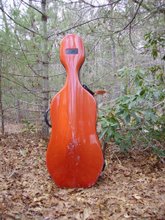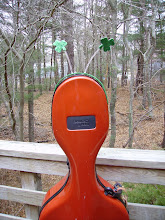I was having intonation problems on a piece in E flat major last week in the early music group: Bach's flute sonata no. 2 (1031) arranged for two flutes, cello, and piano/harpsichord. The cello doubles the piano left hand, and there are some awkward shifts and fingerings I have yet to figure out. I started out playing flute on this piece, so hadn't played it on cello prior to the rehearsal, which didn't help.
The group wanted to speed up the piece, and I made a face. One of the flute players said, "Well, you're just having problems with intonation, not speed." Hmm, maybe fast and out-of-tune is better than slow and out-of-tune because the notes offend for a shorter period of time.
Last evening, I worked with the harpsichord player on my part, first playing E flat scales, then the piece, which consists of three movements, two of which are in E flat and the middle section, the well-known Siciliano, in B flat. We played slowly, correcting the pitches when necessary (a lot in the beginning, but improving later). We changed some of the notes that required awkward shifts (at least until my teacher gets back from vacation).
I made a recording of the harpsichord part alone so that I can continue to practice at home. Of course a recording won't say, "hold it, that F was flat"; it will just keep playing merrily on. But I am encouraged.
Subscribe to:
Post Comments (Atom)












2 comments:
Recording your accompaniement is so useful, isn't it? However, I only use it when I feel really ready because it is rather discouraging to have the hesitations and poor intonation highlighted early on. There's usually a lot of those in my case!
Hi Rallentando, Thanks for dropping by. Yes, listening to your recordings can be discouraging, but I figure if others have to listen to it, I should too, in hopes of improving. My brain is a great editor, smoothing over those hesitations and poor intonation spots, allowing me to think those "I played this perfectly at home!" thoughts.
It really helped to have someone else coaching me. My teacher does this in my lesson of course, but not for two hours like the harpsichord player did the other night. It helps that he also plays the violin, so he knows of the intonation struggle firsthand.
It is interesting to me that when I am playing, I hear only the glorious perfect sound of the cello. :-) Yet I can hear the problems quite clearly on the recording. The coaching is helping me to hear the problems in real time. Scales help too, as does playing familiar easy tunes, in which the only issue is intonation.
Post a Comment